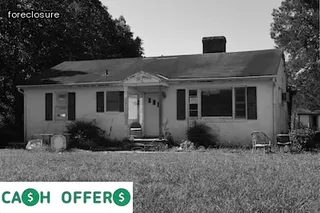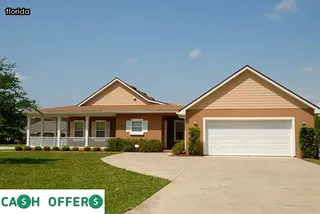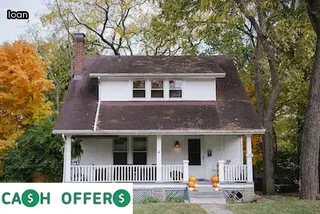When it comes to understanding foreclosures in the state of Florida, there are a few important things to know. Foreclosure is the legal process which allows lenders to repossess a home when a borrower fails to make payments on their mortgage loan.
Knowing the steps of foreclosure and how long it takes in Florida can help homeowners facing financial hardship plan for the future. Generally speaking, foreclosures in Florida take an average of nine months from start to finish, but this can vary depending on certain circumstances such as whether or not the borrower pursues a loan modification or files bankruptcy.
The first step in any foreclosure process is typically notification that the homeowner is behind on their mortgage payments; if they are unable to pay within a certain timeframe, lenders can begin the foreclosure process by filing a lawsuit with the court system. After filing the lawsuit, homeowners may have several opportunities to save their home through various options such as loan modifications or even short sales.
Once all other options have been exhausted, lenders can file a motion for final judgment which will trigger an auction sale of the property; this usually happens within three months after filing. The sale must be advertised for at least thirty days before it occurs, giving homeowners plenty of time to learn more about their legal rights and avoid potential pitfalls associated with foreclosure proceedings.

The pre-foreclosure phase of a foreclosure process in Florida is an important step to understand and recognize. It is the period of time between the homeowner's default on mortgage payments and when the bank or lender takes ownership of the property.
During this time, homeowners have certain rights under Florida law that may help them keep their home. The first step for homeowners is to contact their lender as soon as possible after missing a payment to explore options.
A loan modification may be offered, allowing borrowers to make up missed payments or reduce their monthly payment. Another option is forbearance, which allows homeowners to suspend payments for a limited time while restoring loan balance over time.
Homeowners may also consider a deed-in-lieu of foreclosure option, where they voluntarily give up their home but avoid foreclosure proceedings and any associated costs. Finally, homeowners can explore short sale options if they owe more than the property is worth; this involves selling the house at market value and receiving approval from lenders to forgive any remaining debt after the sale proceeds are paid out.
In short, there is much for homeowners to consider during pre-foreclosure in order to determine what path best fits their needs.
The process of filing and serving a lawsuit to initiate the foreclosure process in Florida can be daunting, but with the right knowledge and guidance, it doesn't have to be. It's important to understand the complexities of filing a lawsuit in Florida courts, as well as the different steps for service of process.
Once a complaint is filed with the court, it must be served on all parties involved in the foreclosure action. This can involve one or more methods including certified mail, personal service, or publication.
After being served with a summons and complaint, each party must respond within 20 days or risk being defaulted by the court. If no response is received within this time frame, then the court may enter a judgment of foreclosure in favor of the lender without any further input from the borrower.
Knowing how long foreclosures take in Florida requires understanding how to properly file and serve a lawsuit under state law and procedure.

When facing a foreclosure complaint in Florida, it is important to be aware of the laws and procedures that govern the process. First, contact an attorney who specializes in real estate law, as they can help provide legal advice on how best to respond to the complaint.
Once the complaint has been received, it must be answered within 20 days or a default judgment may be entered against the homeowner. If a response is filed with the court, homeowners have a chance to enter into negotiations with their lender and work out an agreement.
It is also possible for homeowners to file a motion to dismiss if they believe there are valid reasons for doing so. Additionally, homeowners have the right to challenge any factual allegations made in the complaint or assert any defenses they may have.
During this time period, it is important for homeowners to remain informed of their rights and obligations under Florida's foreclosure laws and procedures.
The discovery process of understanding how long foreclosures take in Florida can be a daunting task. It is important to understand the housing laws and procedures associated with the foreclosure process, as it varies from state to state.
There are several steps that must be taken before a foreclosure can begin; this includes notifying homeowners of their delinquency and providing them with an opportunity to cure the loan default. Homeowners also have legal rights during the foreclosure process, such as being able to dispute or negotiate a repayment plan with the lender.
Additionally, there are certain timelines that must be met throughout the process. For example, lenders must wait for a certain period after notification before they can file a Notice of Default.
After this point, they may then proceed with selling off the house at auction or through other methods. Taking all of these steps into consideration can help potential homebuyers better understand how long foreclosures take in Florida and assist them in making informed decisions regarding their real estate investments.

The COVID-19 pandemic has had a significant impact on foreclosures in Florida. The state government has taken steps to protect homeowners by introducing measures such as forbearance, moratoriums on evictions, and foreclosure proceedings.
This has meant that homeowners have been able to stay in their homes during the crisis and some of those who were already in foreclosure proceedings have been able to find a solution. However, the pandemic has also caused an increase in unemployment and financial hardship for many people, meaning that some people are unable to keep up with mortgage payments even with these protections in place.
It is important to understand how long foreclosures take in Florida and what options homeowners have when facing foreclosure so they can make an informed decision about their situation.
In Florida, the statute of limitations on foreclosures is five years from the date of the last payment. This means that if a homeowner has not made a payment in five years, the lender can no longer pursue foreclosure.
If a homeowner makes any payments during that five year period, however, it will restart the clock and the lender will have an additional five years to pursue foreclosure. The ultimate length of time for a foreclosure may be much shorter than five years depending on various factors such as whether or not a borrower is contesting the foreclosure or if there are other claims against the property such as mechanic’s liens.
In addition, Florida law requires lenders to provide homeowners with notice and an opportunity to cure prior to filing for foreclosure. All of these factors can impact how long it takes for a home to be foreclosed upon in Florida.
It's important for homeowners to understand their rights and legal obligations so they can make informed decisions about their housing situation.

When a homeowner in Florida defaults on their mortgage, the lender may begin the foreclosure process. Homeowners have certain rights during this process that should be understood and respected.
It is important for a homeowner to know when they may receive notice of foreclosure and how long the process takes. The first step of the foreclosure process is for the lender to send a Notice of Default to the homeowner, which provides them with an opportunity to cure the default by paying off their debt or finding an alternate solution with their lender.
After receiving the Notice of Default, homeowners in Florida have 20 days to respond before their lender can proceed with filing a Lis Pendens. Once filed, homeowners have 45 days to respond before they are given a Final Judgment of Foreclosure and are required to vacate their home within 30 days.
Homeowners should also be aware that after receiving notification of foreclosure, it is still possible for them to negotiate with their lenders or seek out other options such as loan modifications or refinancing in order to avoid foreclosure altogether. Knowing one's rights during the foreclosure process is essential in understanding all of the options available to homeowners in Florida and ultimately making informed decisions about how best to protect themselves and their property.
Preforeclosure is an important part of the foreclosure process in Florida. Preforeclosure is the stage before a home is officially foreclosed upon and the homeowner loses his or her rights to the property.
During preforeclosure, homeowners have time to negotiate with their mortgage lender and potentially avoid foreclosure, either by catching up on past-due payments or refinancing the loan. Homeowners may also be able to sell their homes during preforeclosure in order to pay off their debt.
It's important for homeowners facing potential foreclosure in Florida to understand preforeclosure and what it means for them legally. Preforeclosure begins when a homeowner falls behind on their mortgage payments and the lender issues a Notice of Default, which informs the homeowner that they are in default on their loan.
The Notice gives the homeowner a certain amount of time (typically 30 days) to make up any missed payments, typically referred to as curing the default. If this isn't done within the allotted timeframe, then a Notice of Sale will be issued and foreclosure proceedings will begin.

The Florida foreclosure process can be complicated and stressful. Fortunately, homeowners can better understand the process by following a few simple steps.
First, it is important to know that foreclosures in Florida are judicial, meaning they must go through the court system. To initiate the Florida foreclosure process, a lender files a civil lawsuit against the borrower and serves them with papers.
The borrower then has 20 days to respond in writing and submit any defenses they may have. After this response deadline passes, the court will decide whether to issue a final judgment of foreclosure and authorize the sale of the property.
After this ruling, the property will be sold at public auction; however, if no one bids on it or makes an offer that’s higher than what’s owed on the loan, then the lender can repossess it without going through an auction. The entire process usually takes around 3-4 months from start to finish; however, if there are complications or appeals from either side, it could take much longer.
Knowing these steps ahead of time can help homeowners better prepare for their situation and ensure they understand their rights throughout each stage of foreclosure proceedings.
In Florida, if you are having difficulty making payments on your mortgage, there are a few strategies to help prevent foreclosure. Firstly, reach out to your lender as soon as possible and explain the situation.
They may be able to offer a loan modification or forbearance plan that will allow you to manage payments. Secondly, look into the possibility of refinancing your mortgage with another lender.
This can reduce the amount of monthly payments and make them more manageable. Another option is to apply for government assistance programs like Hardest Hit Fund, Home Affordable Foreclosure Alternatives (HAFA) or Making Home Affordable (MHA).
Finally, consider filing for Chapter 13 bankruptcy in order to gain protection from creditors while repaying your debt over time. No matter which strategy you pursue, it's important to act quickly in order to avoid the negative consequences of foreclosure and maintain ownership of your home.

Deficiency judgments have a major impact on homeowners' credit scores, as they are essentially an amount of debt that is owed to the lender due to the foreclosure. When a house is foreclosed, the sale proceeds may not cover the full amount of the unpaid loan, leaving a deficiency balance.
This can be collected through either judicial or non-judicial foreclosure processes, depending on the state's laws and procedures. In Florida, a deficiency judgment can remain active for up to five years and can have a long-term negative effect on a homeowner's credit score.
Deficiency judgments limit access to new loans or even refinancing options in the future, making it difficult for individuals to rebuild their credit after suffering from financial hardship. It is important for homeowners in Florida to understand how long these judgments stay on their records and what steps they can take to try and protect their credit scores during this process.
Understanding the timeline for reapplying for a mortgage after a foreclosure is important for homeowners in Florida. The housing laws and procedures in the state can determine how long it takes before you can start the process of reapplying for a loan.
Generally, most lenders will require that you wait three years after the completion of a foreclosure before being able to apply. This waiting period often applies whether or not you have improved your credit score since then.
In addition, some lenders may require additional requirements such as having an acceptable down payment or agreeing to certain restrictions on the loan. You should speak with your lender to understand their specific requirements and any other limitations they may have in place.
It is also beneficial to review the details of your foreclosure with a legal professional who specializes in foreclosure law so you can better understand your rights and options. Taking these steps can help ensure that you are informed about all aspects of the process, including when you may be able to reapply for a mortgage after a foreclosure.

Bankruptcy can have a major effect on foreclosures in Florida, both delaying the process and potentially preventing it altogether. Filing for bankruptcy creates an automatic stay, which temporarily halts all foreclosure processes.
This suspension of the foreclosure process gives debtors more time to figure out their finances and possibly even save their homes from foreclosure. The type of bankruptcy filed also affects how long the stay is in place; Chapter 7 bankruptcies are typically shorter than Chapter 13 filings, for example.
Although this may seem like a good option for struggling homeowners who want to avoid foreclosure, it comes with its own consequences. Property owners must be aware that filing for bankruptcy will stay on their credit reports for up to ten years and could make it difficult to secure future financing or credit cards.
Additionally, the court has the power to dismiss the case or convert it into a repayment plan if they deem it necessary. It is important that any homeowner considering filing for bankruptcy take the time to understand all of their options and potential consequences before moving forward with any course of action.
Foreclosures in Florida can take anywhere from several months to a year or more, depending on the situation. The process begins when the borrower fails to make payments and the lender files a notice of default (NOD) with the court, which initiates legal action.
The homeowner then has a period of time, often 90 days, to cure their debt before the foreclosure is finalized. If they are unable to do so, the lender will then file for a final judgment of foreclosure (FJF).
This judgment allows them to seize the property and sell it at a public auction. After this happens, the homeowner has no further rights to the property and must vacate it within a certain period of time.
In some cases, this can be as little as 45 days or even longer depending on local laws and procedures. With rising foreclosures rates in Florida, it is important for homeowners to understand their rights and how long it takes for a foreclosure to occur so they can prepare accordingly.

In Florida, the foreclosure process typically begins when a homeowner defaults on payments due to their mortgage lender. The lender will then file a lawsuit against the homeowner, which is known as a lis pendens.
This document informs the public that a legal claim has been made against the property and serves as notice of foreclosure. After filing the lis pendens, the lender will then begin proceedings in court to obtain a judgment of foreclosure.
Once this judgment is granted, the lender can move forward with selling the property at an auction or through other means. During this time, homeowners have the opportunity to pay past due amounts and avoid foreclosure if they are able to do so.
If not, they must vacate the premises once foreclosure proceedings have concluded and all outstanding debt is paid off. Understanding how long foreclosures take in Florida can help individuals make informed decisions about their housing options during this difficult time in their lives.
In Florida, the exact timeline of when a homeowner must move out after foreclosure depends on the particular foreclosure procedure used. In general, a borrower will have at least 21 days to vacate the property following an order of foreclosure.
However, if a judicial sale is used, the borrower will likely have longer than 21 days before they must move out. Additionally, some local municipalities may have their own laws that extend the time frame for eviction even further.
It's important to understand all local requirements and be aware of any additional timelines or procedures you may need to follow after being notified of foreclosure. With proper knowledge and understanding of your rights under Florida law, you can better prepare yourself for what to expect in terms of relocation times following a foreclosure.
In Florida, the time frame for non-payment of a mortgage before foreclosure can vary based on local laws and procedures. Generally, if you fail to make your mortgage payments, your lender may start the foreclosure process when three monthly payments are due and unpaid.
However, in some cases the lender may wait longer than three months to begin the foreclosure process. After a homeowner fails to make their mortgage payments, lenders must first file a legal complaint with the court in order to begin the foreclosure process.
This process can take up to four months or more depending on how quickly the court is able to hear and decide on the matter. In addition, homeowners in Florida have certain rights that protect them from being foreclosed upon prematurely or unfairly.
For example, some counties require lenders to provide homeowners with an opportunity to cure their default before initiating a foreclosure action. It is important for homeowners who are struggling with their payments to be aware of their rights under local law so they can attempt to prevent or delay a foreclosure action as much as possible.
The COVID-19 pandemic has caused many states to put a hold on foreclosures, but what about Florida? Are foreclosures in Florida on hold due to the pandemic, or are they still proceeding as normal? Understanding how long foreclosures take in Florida and how housing laws and procedures have been impacted by the pandemic can help homeowners understand their options. Foreclosure timelines in Florida vary based on the type of loan and the lender’s policies, but generally, it takes between three and six months for a foreclosure to be completed.
However, since COVID-19 hit, some courts have paused foreclosures for a certain period of time. Additionally, federal law requires mortgage servicers to provide borrowers with relief from foreclosure if they experience financial hardship because of COVID-19.
Understanding these rules is important for anyone facing foreclosure who wants to know if their timeline is affected by current events.
When a house goes into foreclosure in Florida, the homeowner must be notified of the lender's intent to foreclose by certified mail. The homeowner then has a period of time (usually 20 days) to respond and take action before the foreclosure process begins.
The foreclosure process can vary depending on the type of loan and whether it is a judicial or non-judicial foreclosure. In most cases, judicial foreclosures are more lengthy than non-judicial foreclosures.
During a judicial foreclosure, the lender must file a complaint with the court, which will result in several steps including notification to the borrower and public notice of sale being posted. After all procedural requirements have been met, the property will be sold at auction to the highest bidder.
Non-judicial foreclosures are typically much faster as they do not involve a court proceeding; however, they still require proper notice to be sent to the homeowner prior to sale. Generally speaking, it can take anywhere from 1 month up to 18 months for a residential property in Florida to go through the entire foreclosure process - depending on whether it is a judicial or non-judicial foreclosure and any delays associated with them.